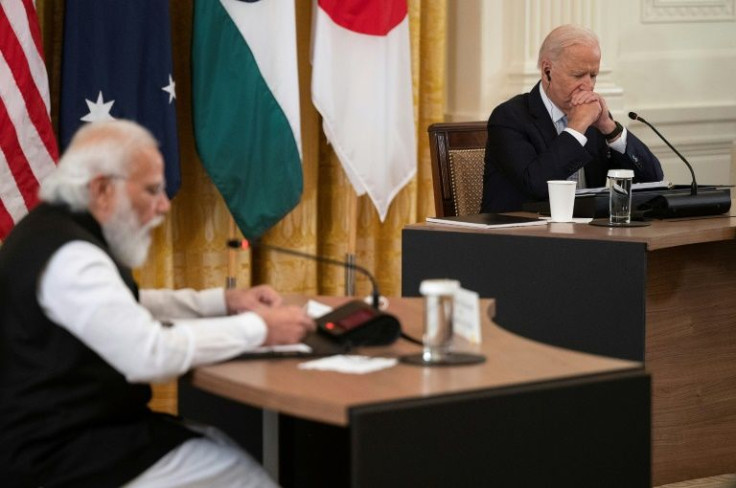US Loses Leverage On New Delhi As Indian-Chinese Troops Disengage At Himalayan Flashpoint
KEY POINTS
- India has preferred to engage China in quiet diplomacy to sort disputes while maintaining tough position
- Washington looks to push India to scales down ties with Russia,
- Western powers pitched India the prospect of deeper ties and security boost in the Indo-Pacific
- New Delhi keen to boost ties with Moscow
As India's Prime Minister Narendra Modi heads to Samarkand in Uzbekistan this week for the upcoming Shanghai Cooperation Organization (SCO) summit, with China's President Xi Jinping and Russian President Vladimir Putin along with other regional leaders, the U.S. may have lost one more leverage it had to push New Delhi out of the Russia-China axis.
The Indian government, in a statement Thursday, announced that Indian and Chinese troops had begun disengaging from the Gogra-Hotsprings border area in the western Himalayas.
Face-off between the two countries began in June 2020, when the two armies were engaged in a violent clash that resulted in the death of 20 Indian soldiers and at least three Chinese troops.
Pointing to India-China tensions, Western experts have repeatedly sought to draw parallels between Beijing's attitude at the Himalayan border with India and its behavior towards Taiwan and in the South China Sea. Former Australian Prime Minister, Kevin Rudd also alluded to this analogy recently.
India understands that unlike others whose conflicts with China are confined to maritime borders, India faces the prospect of an actual military engagement on land.
Meanwhile, the face-off between Moscow and the West brought competing pressure on India to pick sides with intense parleys to woo New Delhi. The west has pitched the prospect of deeper ties and a security boost in the Indo-Pacific. Meanwhile, Russia, faced with Western sanctions, sought to pitch the prospect of selling more oil to India.
Both India and China consider Russia an important strategic partner. Now faced with Western isolation, Moscow would not like to see its Asian partners fighting each other.
India on its part, despite American pressure to think otherwise, has focused on a context-specific approach in dealing with Russia and China, upsetting expectations that New Delhi would be a strong U.S. ally in the Indo-Pacific.
India has, therefore, despite rushing troops and reinforcements, preferred to engage China in quiet diplomacy to sort its border disputes.
As regards Russia, India has called for "diplomacy and dialogue" to end the conflict in Ukraine. New Delhi also defended its decision to buy Russian oil despite the Western outcry with India's Foreign Minister S Jaishankar saying the situation naturally warranted every country to try and get the best deal possible for its citizens.
"I have a country with a per capita income of $2,000. These aren't the people who can afford higher energy prices. It is my obligation and moral duty to ensure that I get them the best deal that I can", said Jaishankar.
Meanwhile, officials in Washington have been trying hard to underscore the American desire that New Delhi scales down its dependence on Russian military equipment, stressing that the Russia-China axis is not good for India.
In its efforts to wean New Delhi away from Moscow, Washington has been preparing a military-aid package aimed at deepening security ties between the two countries and reducing India's dependence on Russian weapons. Reports said the package would include foreign military financing of as much as $500 mn, making India one of the largest recipients of such aid, behind Israel and Egypt.
However, with India pushing for self-reliance in arms manufacturing, New Delhi's focus will be on maintaining an independent position in matters of foreign policy.

© Copyright IBTimes 2024. All rights reserved.





















